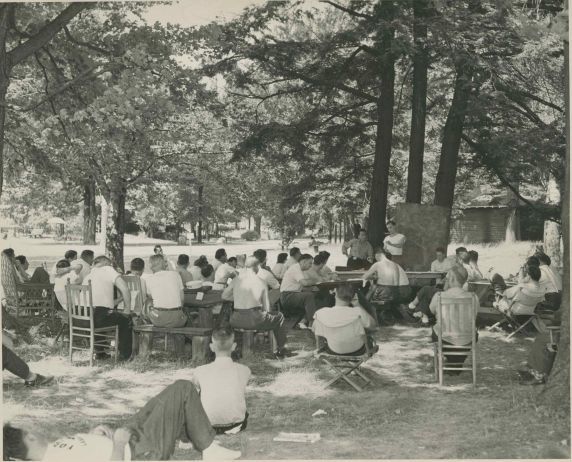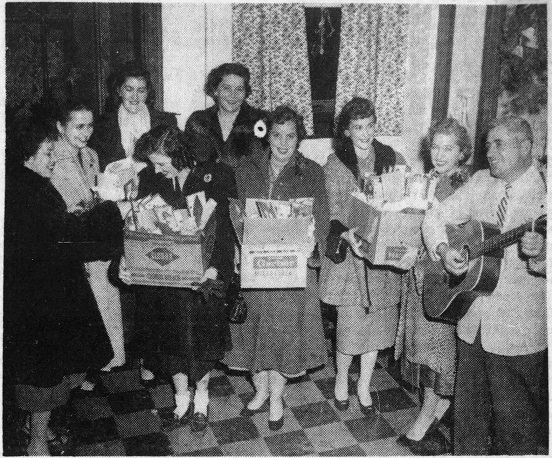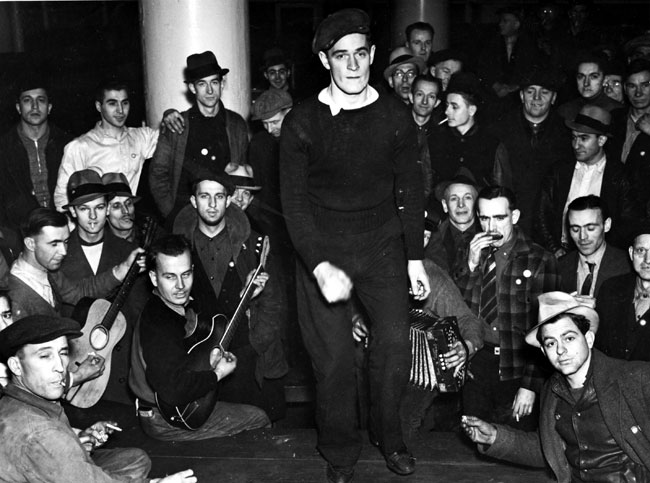Gotta Fight the Bosses… and Pollution
Leif Fredrickson
February 08, 2020
For a long time now, the question of "jobs vs. the environment" has droned in the background of discussions about pollution, sustainability and climate change. The drone questions: Aren't labor and environmentalism inherently at odds? Can there can really be a robust blue-green alliance? When issues like the Green New Deal emerge, the drone becomes an alarm: It makes no sense to lump unrelated issues like a jobs guarantee and renewable energy together!
But here is some noise that might make you rethink the standard story of the blue-green divide. It's a song titled "We Gotta Fight Pollution Now." The song is one of the first – perhaps the first – songs with "pollution" in its title. Did a Greenwich Village folky write this song? Nope. A counter-culture rock band in San Francisco? Nope.
Its author was Joe Lisi, a longtime United Auto Workers (UAW) organizer who released the song on his album It's the UAW All the Way sometime in the mid-1960s. The exact publication year is unclear, but it vies with Tom Lehrer's 1965 song "Pollution" for the first song with that word in its title.
Earlier songs had considered aspects of pollution, such as smog and radioactive fallout. But Lehrer and Lisi's more general songs about pollution reflected Americans' increasing integration of many environmental problems under the rubric of "pollution." Lehrer's was a joke song, part of a comedy album. Lisi's was a no-nonsense call to arms, part of a suite of pro-labor songs. Lehrer's album was intended for a broad audience; Lisi's was for unionists and local activists.
It may seem strange that a fifty-something UAW member would be on the leading of edge of environmental songwriting. But that is largely because we have accepted the blue-green divide as a timeless truth. It's not, as the history of labor, and the UAW in particular, shows.
First we need to go back to another divide. The long process of industrialization from the eighteenth century to the twentieth century, changed how people worked. Laborers lost considerable the control over what they produced and how they produced it. One consequence was that the divide between work and leisure became more regimented. Work became toil; outside of toil, there might be some time off to do as you pleased.1
While industrialization increased standards of living, it also brought dissatisfaction with work and living conditions. Workers faced unsafe, unhealthy and unstimulating work conditions. And industrialization changed not just how people worked, but where they worked, concentrating more people in urban areas. In industrial cities, workers suffered intense pollution, lack of sunlight, an limited access to parks, clean water, and other natural amenities.
In the twentieth century, the automobile industry was ground zero for alienating mass-production. As the factories of Henry Ford began churning out millions of cars in the 1920s, autoworkers turned to hunting and fishing to get respite from factories, the "teeming cities," and the "rush of everyday living" (as one working-class sportsmen's club journal put it).
In the 1930s, autoworkers organized their union. The UAW fought for better pay, benefits, and working conditions. It also fought for more leisure time – in no small part so that workers could get into the outdoors. But the UAW also responded directly to working-class desire for nature through a Recreation Department (1939) and summer camps like Port Huron on Lake Michigan (1947). The head of the Recreation Department argued that recreation could be hunting, fishing, planting a garden or just "lying on a river bank on a summer afternoon, looking at the sky." It was whatever was needed to satisfy the "mental and spiritual cravings" or workers; to let them "become complete and happy individuals."
Union summer camp. Source: Walter Reuther Archives.
It was in this context that Joe Lisi, a worker at the Mack truck factory in New Brunswick, New Jersey, was elected as head of the recreation committee for UAW local 824 in 1951. The local, according to the papers, was "going in for recreation in a big way."2 By 1954, Lisi had earned a reputation as "Mr. Recreation" in union circles.3
Lisi rose to regional director in UAW and continued to have a strong role in recreation. All the while, he played his guitar and sang. Throughout the 1950s, Lisi serenaded union meetings for rubber and steel workers, while also playing a variety of community events.4 During John F. Kennedy's 1961 campaign, Lisi went on the road, singing songs for JFK, who eventually invited him to the inauguration.5
Joe Lisi visits a hospital to play for the chronically ill in 1958. Source: The Daily Home News.
In the mid-1960s, Lisi and the UAW battled for worker protection laws.6 But they also continued advocating for recreation, because they believed that with longer vacations and earlier retirement, workers would need recreation more than ever.
In the 1960s, the UAW also increasingly promoted environmental consciousness (not just recreation) among its members and strong environmental programs at the national and local level. Under its dynamic leader, Walter Reuther, the UAW became a leader of the emerging environmental movement.
Working-class interest in the outdoors had translated into a growing awareness about ecology and pollution in the 1940s and 1950s. The UAW cultivated this even more through its summer camps. In 1965, it hosted an unprecedently large conference on clean water, attended by thousands of unionists, environmentalists and politicians. In 1967, the UAW created a Conservation and Resource Development Department, which advocated for stricter emissions standards for cars in order to reduce air. The auto industry opposed these standards, but the UAW supported them even if it cost jobs. As the union put it, autoworkers had to "breathe the same air and drink and bathe in the same water" as everyone else. Lisi himself praised the UAW's air pollution initiatives in 1968.7
The UAW also worked on local environmental issues, such as the Down River Anti-Pollution League in Detroit. Lisi, for his part, was involved in local pollution issues surrounding the Raritan River in New Jersey.8
It was sometime in this period, from 1965 to 1967, the Lisi released his album It's the UAW All the Way. The album begins with a song "UAW All the Way," a song Lisi apparently wrote based on the union's campaign slogan during JFK's campaign: "UAW – All the Way with JFK." That was a recent song, but many of the other songs on the record were covers of older labor songs, such as "We Shall Not Be Moved," "Roll the Union On," and "Union Maid." Over the course of the twentieth century, unionists, especially the UAW, developed a rich archive of labor songs and many iconic labor troubadours.
The record closed with the most iconic union song, "Solidarity Forever," penned in 1915 by Ralph Chaplin of the Industrial Workers of the World (IWW). The IWW had used songs to connect with illiterate workers in their quest to overthrow capitalism. Autoworkers revived the song for the Flint sit-down strike in 1936 to maintain morale and mitigate tedium through the drawn out battle. That strike had given rise to the UAW. By the 1960s, the UAW was a more conservative union, and was far less radical than the IWW. But the song remained in the stable of organizer-troubadours like Lisi.
Workers Dance and Play Music During the Flint Sit-Down Strike of 1936-1937. Source: Walter Reuther Archives.
Lisi's record, thus, primarily promoted the idea of having faith and loyalty in the union. But Lisi's interest in recreation and the environment also shone through, and not just because he touted them on the back cover.
"The Mill was Made of Marble," for example, championed both economic and environmental objectives. Written by Joe Glazer, the song described going to heaven where not only is the mill made of nice stuff – marble and gold – but its "built in a garden" with "flowers and trees all around." There's no dust, no lint and the air is "fresh and so fragrant." There is also no noise – no "clatter or boom" – it's just "quiet and peaceful." The song starts out "pie in the sky," as another labor troubadour Joe Hill, of the IWW, would have said. But the narrator ends by wondering if there will be such a mill like that "down below here on earth / for workers like you and like me." So, in addition to dreaming of a world with full employment, food for children, and fancy factories, the song also wishes for a world with green space and without noise and air pollution.
The most explicitly environmentalist song on the album, though, is the closer for side one: "We've Gotta Fight Pollution Now." It goes:
We've gotta fight pollution now / Down by the riverside (x3)
We've gotta fight pollution now / Down by the riverside (x3)
To keep our waters clean
We've gotta fight pollution now (x5) / To curb pollution now
The UAW's working hard / Down by the riverside (x3)
The UAW's working hard / Down by the riverside
To curb pollution now
When all of us join hands and meet / Down by the riverside (x3)
When all of us join hands and meet / Down by the riverside
We'll keep our waters clean
We've gotta fight pollution now (x5) / To curb pollution now
The muck and gook is oh so deep / Down by the riverside (x3)
The muck and gook is oh so deep
Industrial waste to blame
Let's show the federal government / Down by the riverside (x3)
Let's show the federal government / Down by the riverside
The battle must be won
We've gotta fight pollution now (x5) / To curb pollution now
With lots of funds and manpower / Down by the riverside (x3)
With lots of funds and manpower / Down by the riverside
Pollution can be curbed
So let's all get together now / Down by the riverside (x3)
So let's all get together now / Down by the riverside
And have our water clean
We've gotta fight pollution now (x5) / To curb pollution now (x3)
In a way, "Gotta Fight Pollution" is analogous to many of the unionist songs: Simple refrains, sung with gusto and conviction. But the song is also notably specific in the causes and cures for pollution. It's a solidly Great Society approach to pollution: it does not go so far as to identify capitalism as the root cause of pollution (as the IWW might have), but it also doesn't treat pollution as a tragedy of individual selfishness. Industry is the culprit. The main solution is a strong federal government and ample public funding – not the voluntary actions of atomized individuals (as many later didactic pollution songs would suggest).
Joe Lisi, “It’s the UAW All the Way,” Lem Productions, ESS-1185, ca. 1966.
It's a fight song – somewhat ironically, given its roots. Like many union songs, it borrowed its tune, in this case from antebellum spiritual "Down by the Riverside," which was about peace and reconciliation. (In fact, the peace movement also revived it in the 1960s). Lisi's version at once transforms this peace song into a fight a song, while also fortifying the motif of the river as a sacred (if more secular) space.
Lisi's song – a song of solidarity against industrial pollution – gives the lie to idea that working-class people and workers' unions were indifferent or antagonistic to concerns about the environment. Simply put, one of the first songs about pollution was written by and for factory workers.
Still, we have to grapple with why the drone of "labor vs. environmentalism" has pervaded our thinking so much in the past few decades. That means grappling, briefly, with what happened from the 1960s to today.
In the 1960s, many working-class and middle-class environmentalists were allied in a fight against pollution and in favor of an improved quality of life. That alliance began in the 1960s and lasted into the early 1970s – through the passage of major environmental and occupational health legislation.
But the energy crisis of the 1970s, and the concomitant economic stagnation, drove the thin edge of a wedge between workers and middle-class environmentalists as the latter failed to expand their vision of a better society to include many of the concerns of workers. A growing alliance of businesses and conservative think tanks hammered away at that wedge in the 1970s and 1980s. Increasingly, the media and politicians characterized the working-class as uninterested in environmental issues, and environmentalism became synonymous with a narrow set of middle class concerns.9
Today, labor and environmental agitation are on the rise. Labor strikes have been on the rise in the past few years. Major teachers' strikes have rocked several cities and states, and the United Auto Workers (UAW) launched its first strike in a decade. (Along with it, came a new batch of inspiring of unionist songs such as GmacCash's "On Strike."). At the same time, climate activists, most of them young students, have launched weekly strikes and many other protests.
More than anything, the Green New Deal has brought the promise and problems of cross-class environmentalism to the fore. As a political matter, it has faced challenges from some workers and unions who are suspicious of it because they feel they have not been included in the discussion or because they are suspicious that the "just transitions" aspect of it will come to pass. But as newer environmental justice and climate justice groups have emerged with more expansive views of environmentalism, and as some older mainstream environmental groups have also broadened their vision, unions and workers have embraced the Green New Deal more. "Solidarity Forever" can be both a statement of working-class strength and a statement of environmental sustainability.
Leif Fredrickson is a historian and creator of Enviro-History.
Notes
-
Most of this background on working-class environmentalism and the story of the UAW is based on the work of Chad Montrie. See especially, Montrie, Making a Living: Work and Environment in the United States (University of North Carolina Press, 2008). Also: Montrie, The Myth of Silent Spring: Rethinking the Origins of American Environmentalism (University of California Press, 2018). ↩
-
Central New Jersey Home News, November 18, 1951. ↩
-
Central New Jersey Home News, October 9, 1954. ↩
-
Central New Jersey Home News, October 9, 1954; Central New Jersey Home News, December 23, 1958. ↩
-
Central New Jersey Home News, January 21, 1961 ↩
-
Central New Jersey Home News, August 2, 1965. ↩
-
The Daily Messenger, May 14, 1968. ↩
-
Central New Jersey Home News, April 26, 1966. ↩
-
Robert Gordon, "Shell No!": OCAW and the Labor-Environmental Alliance," Environmental History 3.4 (October 1998). ↩
Citation
Leif Fredrickson, "Gotta Fight the Bosses… and Pollution," Enviro-History.com, February 08, 2020, http://Enviro-History.com/uaw.html.




